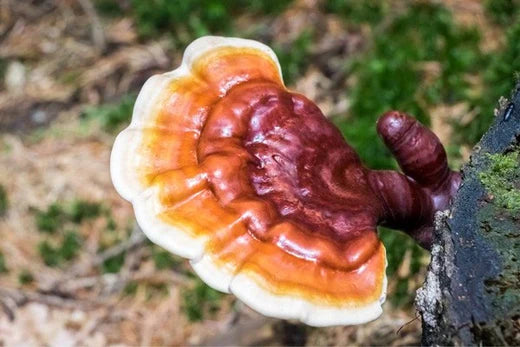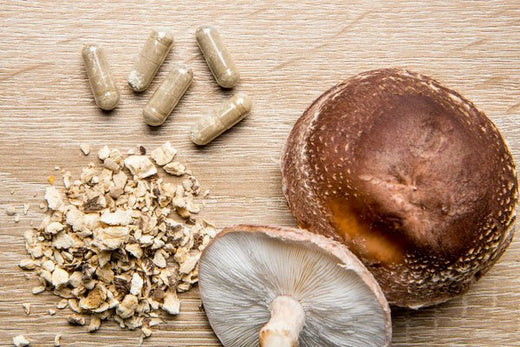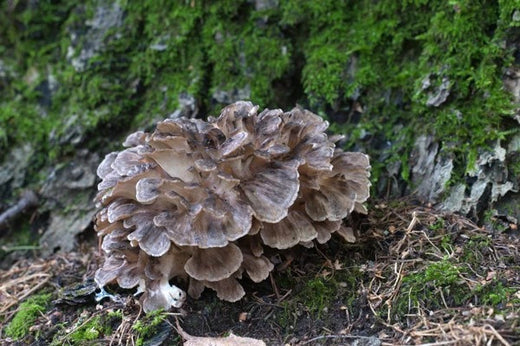Lion’s Mane Mushroom | Boosting Brain Health And Efficiency

Lion's Mane mushroom (Hericium erinaceus) is widely acknowledged as one of the most exceptional medicinal mushrooms and superfoods available.
It possesses natural "nootropic" properties and is renowned for its remarkable ability to enhance brain function and stimulate the production of nerve growth factor (NGF) within the brain.
NGF plays a crucial role in various activities that promote brain development and protection, including the regeneration of brain and nerve cells, the formation of new neural pathways, the support of myelin sheath growth, as well as the maintenance of the nervous and immune systems while aiding in mood regulation.
In our society, we highly esteem individuals who work tirelessly, considering it a badge of honor.
Given the constant societal pressure to continuously perform and be in a perpetual state of alertness, it is unsurprising that Lion's Mane has garnered the interest of elite athletes, entrepreneurs, and dedicated students seeking to enhance their performance and stay ahead of the game.
"If you find that your best isn't sufficient, consider trying Lion's Mane."
Imagine experiencing improved mood, increased focus, and enhanced memory and concentration in your daily life.
With the escalating level of stimuli in our society, from overexposure to television, cell phones, and video games to the overwhelming stress and excessive workloads leading to decision fatigue, compounded by the ever-increasing pollution in our environment and the consumption of chemical-laden foods, it is evident that our attention spans are diminishing, our ability to be present in the moment has waned, and our brain health is deteriorating rapidly.
Lion's Mane and other supplements that boost brain function may hold the key to addressing our declining cognitive well-being. Moreover, scientific research supports the reported health benefits and claims associated with Lion's Mane.
Studies have demonstrated that Lion's Mane enhances cognitive abilities, and improves brain function, memory, recall, and concentration. Regular consumption of Lion's Mane may yield profound neurological benefits and cognitive enhancements.
Furthermore, there is evidence suggesting that Lion's Mane aids in uplifting mood, reducing inflammation in the brain and gut, and alleviating depression and anxiety disorders.
Table of Contents
- A Brief Glimpse of History
- Lion’s Mane Boosts Brain Efficiency
- Deeper Understanding of Nootropics
- Lion’s Mane and Nerve Growth Factor (NGF) Enhancement
- Blood Barrier Issues
- Lion’s Mane Comprising Bioactive Compounds
- High NGF | Associated With Romantic Love
- Strengthen Your Digestive System
- Finest Quality Lion’s Mane Extracted Supplement
- Dosage Recommendation
- How to Incorporate in Your Daily Lifestyle
A Brief Glimpse of History
Known by a variety of intriguing names like Lion's Mane, Hedgehog Mushroom, Bearded Tooth Fungus, Pom-Pom Mushroom, Monkey Head, Satyr's Beard, and Yamabushitake in Japan, Hericium erinaceus is a distinct mushroom species. This fascinating fungal specimen has been utilized in Traditional Chinese Medicine (TCM) for many centuries as a vital herbal remedy and health-enhancing tonic.

This mushroom is notably appreciated in culinary circles in Japan and China for its unique texture, which is likened to meat. Some culinary enthusiasts even draw parallels between its taste and that of seafood, such as shrimp and lobster. Regardless of whether this comparison is a stretch, it's undeniably one of the most palatable mushrooms available.
Lion's Mane is instantly distinguishable due to its long, descending spines that look like pristine white icicles, creating an appearance reminiscent of a lion's mane. This mushroom proliferates across China and North America, typically appearing in the later part of summer and fall. You'll commonly find them clinging to logs and hardwood trees, the American beech tree is a favorite.

Lion’s Mane Boosts Brain Efficiency
Lion's Mane mushroom is renowned for its potent cognitive-enhancing abilities. Unlike plants that generate their own food from sunlight, mushrooms, such as Lion's Mane, lack chlorophyll and are known to grow more rapidly during the night. It is speculated that they derive their energy needs from lunar energy, which is theorized to stimulate the brain's capacity for intuition and imagination.
Consider this: of the approximately 120,000 types of fungi discovered globally, Lion's Mane stands alone as the sole mushroom reported to have beneficial effects on brain health. This fact is truly astonishing!
Though Lion's Mane mushroom's reputation for brain health is well-deserved, it also provides a plethora of additional benefits:
- Mood Enhancement
- Memory Improvement
- Stress Reduction
- Nervous System Support
- Energy Boost
- Gut Health Improvement
- Immunity Enhancement
- Antioxidant Increase
The saying goes that Lion’s Mane can provide you with the "memory of a lion and nerves of steel." It is rich in antioxidants, beta-glucans, and other distinctive polysaccharides that bolster and fortify the immune system. The mushroom is a treasure trove of minerals, amino acids, polypeptides, and fatty acids.
Lion's Mane has earned the moniker "smart mushroom". The nootropic community lauds it as one of the premier natural cognitive enhancers available.

Deeper Understanding of Nootropic?
Nootropics, often referred to as "brain enhancers," are compounds, either naturally derived or synthetically made, that aim to bolster cognitive function and mental prowess. These substances have gained traction among students, business people, and employees in technology startups as they seek to supercharge their cognitive faculties.
While many of the nootropics available today are synthetically produced, with modafinil being a well-known example, Lion’s Mane mushroom is a standout in its category as one of the rare naturally occurring substances that successfully boosts brain performance and cognitive function. It is frequently dubbed as 'Mother Nature's Nourishment for the Neurons.'
The categorization of Lion’s Mane as a nootropic is primarily based on its capacity to encourage the production of nerve growth factor (NGF).
Lion’s Mane and Nerve Growth Factor (NGF) Enhancement
One of Lion’s Mane's most noteworthy qualities is its ability to promote the production of NGF in the brain. NGF is a crucial component required by the brain and significant sensory neurons to maintain a robust and healthy nervous system.
NGF is a tiny protein-like entity, part of a group of neurotrophic substances responsible for building the brain. NGF plays a pivotal role in the growth, development, upkeep, and survival of nerve cells. In its absence, neurons could perish, leading to substantial cognitive and motor difficulties.
NGF aids in the growth, preservation, and survival of axons, the part of the nerve cell responsible for transmitting information via electrical impulses to other neurons, muscles, and glands. It assists in repairing the myelin sheath, the protective layer around the axons, and accelerates the process of myelination.
Several scientists posit that NGF is crucial for the plasticity of the hippocampus and learning. In a specific animal experiment, mice were subjected to an environment lacking NGF, which led to induced learning and memory deficits. Following this, they were provided with Lion’s Mane to observe its effects. The study reported:
"Findings showed that H. erinaceus staved off spatial short-term and visual recognition memory impairments..."
Regrettably, NGF decreases with age, resulting in less optimal brain function. In animal experiments, a lack of NGF has been associated with a condition similar to Alzheimer's disease.

In the 1950s, NGF, or Nerve Growth Factor, was first identified by Rita Levi-Montalcini, an Italian biologist, and Stanley Cohen, an American biochemist. Their groundbreaking work led to them receiving the Nobel Prize in Physiology/Medicine in 1986. Remarkably, Dr. Levi-Montalcini, who lived beyond 100 years, stated that her mental capabilities were more robust in her later years than they were forty years prior. She believed this longevity and vitality were due to her daily use of NGF eye drops.

Blood Barrier Issues
Lion's Mane, a unique mushroom, is known to stimulate the production of NGF and can cross the complex blood-brain barrier. It's important to understand that enhancing NGF levels is a challenging task. Since its discovery, scientists have faced hurdles in developing compounds capable of crossing the blood-brain barrier to stimulate NGF in the brain, due to the molecular size of most substances. The blood-brain barrier serves as a protective filter within capillaries supplying the brain and spinal cord, blocking harmful substances from entering the brain cells.
A significant advancement was made when Hirokazu Kawagishi, Ph.D., uncovered a group of compounds in Lion’s Mane that could stimulate NGF production, leading to neuron regeneration.
Lion’s Mane Comprising Bioactive Compounds
Lion’s Mane hosts two distinctive fat-soluble compounds, namely hericenones and erinacines. Both these compounds exhibit potent antibacterial properties and stimulate the production of NGF. Hericenones are responsible for initiating NGF production within the brain, while erinacines can cross the blood-brain barrier. The combined effects of these compounds enhance NGF production in the brain.
Many supplements claiming to boost NGF fail due to their inability to cross the blood-brain barrier. This makes Lion’s Mane stand out as one of the most effective natural substances for enhancing NGF.
Tackle Your Anxiety & Depression
The active compounds in Lion’s Mane show promise in repairing neurological damage, improving cognitive abilities, and reflexes, and potentially promoting neuroregeneration. This could be beneficial for neurological conditions such as dementia, Alzheimer's, and Parkinson's disease.
Early studies suggest that another compound from Lion’s Mane, known as amyloban, may protect against neuronal cell death triggered by toxic amyloid peptides. These amyloid plaques accumulate in the brains of Alzheimer’s patients, leading to neuron degeneration as the disease advances.
Preliminary findings also indicate that amyloban can boost energy, enhance mood and memory, and promote a better sense of well-being. However, further research is needed to fully understand the range of bioactivities amyloban offers.

High NGF | Associated With Romantic Love
A fascinating study from the University of Pavia, Italy, in 2005 revealed a substantial increase in Nerve Growth Factor (NGF) levels among individuals who had recently fallen in love. The study, which compared 58 new lovers with two control groups comprising single individuals and those in long-term relationships, demonstrated that those in the early stages of a romantic relationship had notably elevated NGF levels.
However, after a year, a duration sufficient for the initial passion to wane, the NGF levels in those in love declined to become indistinguishable from the control groups. This suggests that the behavioural and psychological changes accompanying the state of being in love could be linked to elevated NGF levels in the bloodstream.

Strengthen Your Digestive System
In terms of promoting digestive health and maintaining gut balance, the Lion's Mane mushroom is highly beneficial. This mushroom has been a staple in Traditional Chinese Medicine (TCM), known for enhancing stamina, vitality, and digestion, and providing relief for a range of gastrointestinal conditions such as ulcers and chronic gastritis.
Research, both in vivo and in vitro, has shown that Lion's Mane, due to its powerful immune-modulating and anti-inflammatory properties, could potentially prevent and even heal ulcers. A 2013 study investigating the gastroprotective effects of Lion's Mane mushroom against ethanol-induced ulcer in rats revealed that the mushroom extract significantly reduced ulcer area and prevented the depletion of antioxidant enzymes, thus safeguarding gastric mucosa.
Finest Quality Lion’s Mane Extracted Supplement
For optimal benefits, including NGF synthesis, brain health improvement, and nervous system support, it is recommended to consume a concentrated dual-extract of Hericium erinaceus fruiting body, also known as Lion's Mane. The dual-extraction method utilizes both water and alcohol to extract a comprehensive range of constituents in the mushroom. In Lion's Mane's case, alcohol is employed to extract the adaptogenic fat-soluble compounds, such as hericenones and erinacines, possibly amyloban, while hot water extracts the immune-modulating beta-glucans (water-soluble polysaccharide compounds). The absence of alcohol extraction would only yield the immune-modulating polysaccharides in the final extract, excluding the fat-soluble compounds that promote brain and nervous system health.
Dosage Recommendation
Teelixir recommends commencing with a daily dose of 1/2 teaspoon of Lion’s Mane mushroom dual-extract. Despite its calming and soothing effects, if you find your system is generally reactive to herbs, you might want to consider beginning with a 1/4 teaspoon. Depending on how your body responds, you may gradually adjust your dosage to meet your individual needs. This extract isn't affected by heat, and Lion’s Mane mushroom is safe and non-toxic, with no reported adverse effects.
How to Incorporate in Your Daily Lifestyle
The taste of a concentrated dual-extract of Lion’s Mane mushroom is often described as earthy with a hint of bitterness. It blends seamlessly with various beverages such as coffee or tea, and can also be incorporated into your preferred smoothie or dessert recipes. Making Lion’s Mane mushroom tea is a breeze: simply stir 1/2 teaspoon into a cup of hot water. You can also create a potent health-enhancing elixir by blending Lion’s Mane with other tonic herbs, adaptogens, and nutrient-dense mushrooms.
If you're fortunate enough to acquire fresh Lion’s Mane mushroom, dice it finely and sauté lightly in coconut oil or grass-fed butter. A sprinkle of sea salt and black pepper completes the dish! Although this delectable mushroom may not possess the same medicinal potency as its extract form, it still packs a substantial health punch.
The inclusion of Lion’s Mane in our daily meals can form a smart strategy for maintaining brain health and regulating mood. Teelixir takes pride in providing the only certified organic concentrated dual-extract of Lion’s Mane mushroom fruiting body available in Australia. Give it a try today!
References:
- The Power of the Lion’s Mane Mushroom by Ward W. Bond PhD, Ken Babel
- Medicinal Mushrooms: A Clinical Guide by Martin Powell
- http://nootropicgeek.com/lions-mane-mushroom-review/
- https://www.selfhacked.com/blog/all-about-nerve-growth-factor-and-50-ways-to-increase-it/
- https://theconversation.com/explainer-what-is-the-blood-brain-barrier-and-how-can-we-overcome-it-75454







